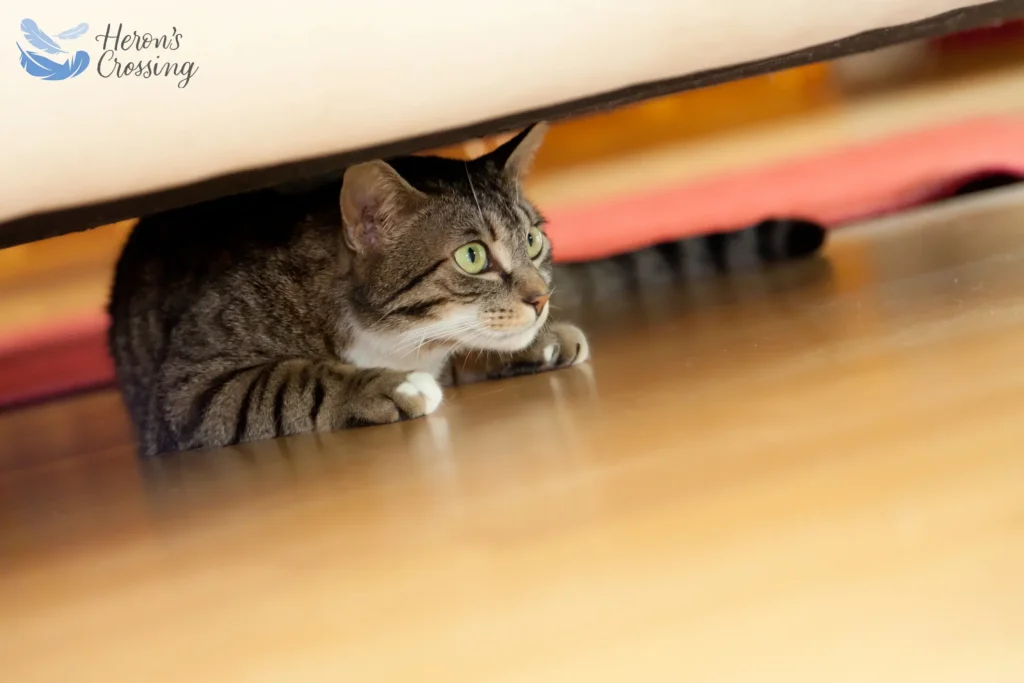Unlike dogs, who tend to want to play first and ask questions later, cats are more sensitive to everyone and everything. They can ‘read the room’ so they are cautious about new situations or ongoing difficulties, with emotions running anywhere from stand-offish irritation to absolute panic.
How can you tell?
Anxiety reactions include backing away, trying to run, pacing back and forth, trying to hide, wide eyes, tail and ear flaps tucked in, shaking or trembling, crawling under furniture or a blanket, excessive licking of paws or coat, sudden vomiting, losing appetite, trying to hide, and peeing outside of the litter box either from a nervous bladder or simply expressing their opinion in liquid form.
Momentary Anxiety-Producing Situations
Typically, this is during transit or at the vet’s office. Simply hold your little one and assure her that you are there for her. Hold the cat carrier in your lap to make her feel more secure. Distract your kitty with a good ear or chin rub. If you feel confident that your cat won’t bite, a gentle chest rub helps to relax.
Helping with Long Term Anxiety
Typically, this is a home situation. Lasting changes may need to be made. Suggestions include:
Schedule – Provide routine as much as possible, so your cat can anticipate what comes next. This will be especially important with new additions to the routine, so, for example, she can anticipate when her medication is coming, or that the new puppy gets fed first and will then be removed so she can eat in peace.
Music – Avoid putting your cat in situations where there is a lot of noise. However, gentle, relaxing background music of a piano or string symphony, simple piccolo or flute compositions, or sustained resonances and mantras can help to lull your cat into a relaxed state. The sound of another cat purring also works wonders. Pet stores have several devices that purr or play pet tunes.
Fountain water bowl – The rhythmic sound of flowing water from fountain water bowls relaxes pets. If placed near her bed in a room away from house traffic, your cat will sleep better.
Playtime – Have periodic relaxed play time with your cat if she is willing. Throw a wad of paper for her to chase, squiggle a belt across the floor for her to attack. Hide something under the covers, or in the laundry basket for her to dig out. Get some mouse toys, jingly balls and food puzzles to coax her into doing more activity on her own.
Interest – You may also provide entertainment with ‘bird TV’ videos on YouTube that film birds, squirrels and woodland creatures going about daily life. The chattering and sudden movements keep cats intrigued for as much as an hour at a time.
Sunshine – Provide a place near a window for your cat to watch the world go by, or to sleep in the sun. Sunshine improves mood and also helps to strengthen the immune system.
Clean living – The litter box is a source of stress for many cats, especially in busy households. Keep the box cleaned, use scent-free litter, and put the box in such a place that it provides at least two directions for escape if she needs it.
OTC remedies – Calming pheromone sprays or diffusers like Feliway Optimum are available at pet stores.
Workout room – Exercise relieves anxiety and takes the mind off of problems for a while. A scratching post or cat tree can help to provide muscle exercise and the natural need for scratching to relieve anxiety.
Sanctuary and serenity – Kitty needs a place where she can retreat to feel absolutely safe and at peace. Often that’s a closed bedroom, under the bed, or inside a cozy closet, with no extraneous sounds.
Electric fan – A small electric fan in the room provides a mild, calming breeze, plus a soothing ‘white noise’ that blocks out what’s going on in the rest of the house.
Extreme Measures
When all else fails, your vet may give a prescription for relaxation, or may refer you to a cat behavior specialist who can discover anxiety triggers and help to re-form responses to them.
How will you know when your cat is doing better?
Any of these suggestions, or a combination of them may help your cat find her individual best methods to relax. You’ll know your cat is doing better when she is calm and sociable, and has a good appetite. She’ll come out of hiding, stretch out comfortably, and say she’s ready for whatever you and the family have going on. Who knows? You may even find some of these de-stressing remedies helpful, yourself. Well, maybe not the one with chattering squirrels.
Heron’s Crossing provides end-of-life care for pets in the Metro Atlanta area. In-home appointments with compassionate vets are available. If you’d prefer a home-like setting away from your home, our Decatur office is also available by appointment.

